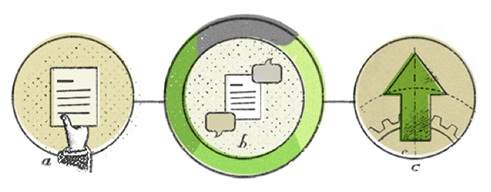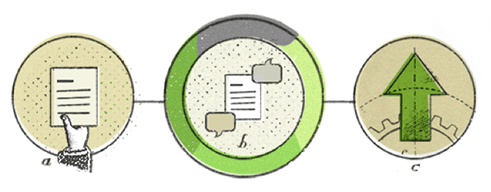Finally, there is a new way to measure your scientific reputation in the world’s best Professional Scientific Research Social network – ResearchGate. The scientific research reputation is computed based in user’s activities, publications, engagements (scientific questions – answers), downloads, followers and other factors. This scientific reputation is termed as RG Score on a scale from zero (to unspecified upper rank.)
Learn what is research gate score and how it measures scientific reputation. New way to measure scientific networking reputation with RG Score via the world’s best Professional Scientific Research Social Network ResearchGate.
According to ResearchGate, the RG Score helps turn all your research into a source of reputation. Whether it’s the questions and answers you contribute to the network, or the publications, negative results, and raw data you upload, anything can become a factor in your RG Score.
How does Scientific Reputation RG Score works?

| Content First create content or upload some to ResearchGate. | Interactions Your score goes up when researchers interact with your work. | Reputation The higher their score, the more your score will increase. |
This German based professional network for scientists has been a huge success after its launch 4 years back. From the first screenshot (above) of the scientific reputation score RG of 11.72, the score looks real scientific. However, the RG team has not released any information on what is the actual algorithm behind. Measure scientific reputation for your account and compare with mine.
[adrotate banner=”3″] Your RG Score is calculated based on how other researchers and friends interact with your content, how often, and who they are. The higher their score, the more yours will increase. This is more of spanning tree or reputation-based hierarchy algorithm for computation of the score. So, how does your scientific reputation measure like? Here is the exact press release about measuring your scientific reputation and how Reseach Gate does it.
[box title=”ResearchGate Introduces the RG Score: A New Way to Measure Scientific Reputation” color=”#333333″]
Berlin, August 8, 2012 – ResearchGate, the professional network for researchers, today announced the launch of the RG Score, a new metric to measure scientific reputation. More than 1.9 million scientists currently share papers, publish data and engage in discussions on the platform. The RG Score makes these interactions, which are a crucial part of the research process, both visible and quantifiable.
Although the traditional scientific publishing model has brought countless innovations and advancements to light, the speed of discovery is often hindered by the lack of speed in publishing. ResearchGate fulfills the need for a new system that reflects the ever-increasing pace of science. Researchers are now able to publish their results in real-time, benefit from the immediate feedback of their peers and, through the RG Score, turn all of their work into a source of reputation.
Whether raw, negative or inconclusive data, there are no restrictions on what a researcher can publish on ResearchGate, or on what can become a factor in their RG Score. Not only does this help researchers receive credit for all their work, it also ensures absolute transparency across the entire research process. ResearchGate co-founder and CEO Dr. Ijad Madisch points out the need for a system that gives science back to the research community: “The RG Score allows real-time feedback from the people who matter: the scientists themselves.”
A researcher’s score is calculated based on how the rest of the community interacts with their content, how often, and who it is that’s interacting. Madisch says: “This new metric ensures that reputation is defined and given directly by peers, eliminating the middle man.”
[adrotate banner=”3″]
The RG Score enables researchers to demonstrate their standing within the network and beyond. “Scientists can use the metric when applying for jobs and grants,” says Madisch. Especially for researchers at the start of their career, the RG Score will open doors, by allowing them to build their reputation, whether having been published in journals or not.
[/box]


Ekendra notes: "However, the RG team has not released any information on what is the actual algorithm behind [it]". Indeed not. They offer no plausible explanation for how or why someone's RG score can drop by 3-4 points in one week, especially when there were 20 up votes during that week. It happens more than can be explained by a programmer's error. If you are in academia or in the real world, you should not waste your employer's time raising your RG score. It probably doesn't help them, or you. However, if you are retired, it can be a very useful way to help those with questions in your discipline. And, if they appreciate your help they might even Up-vote you. If they disagree…a down-vote can appear. You will know who it is if it's an up-vote. You will not know (for sure) if it's a down-vote. Be careful?